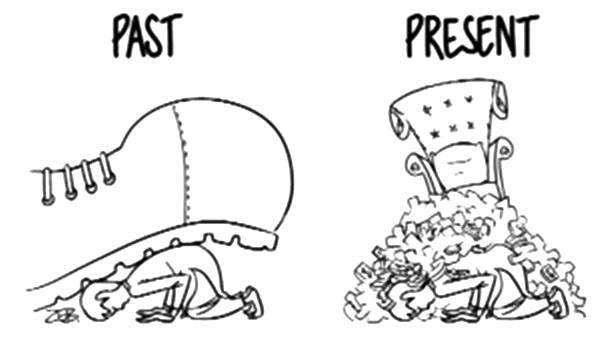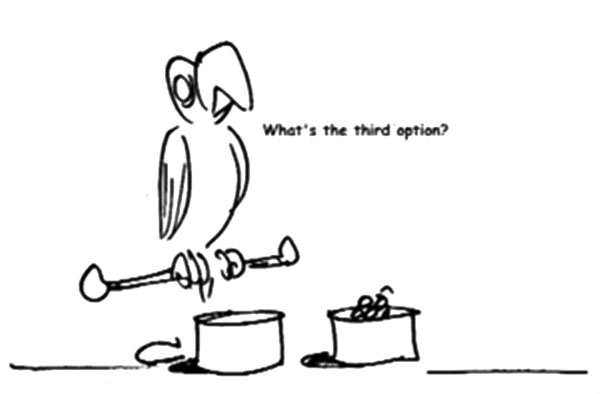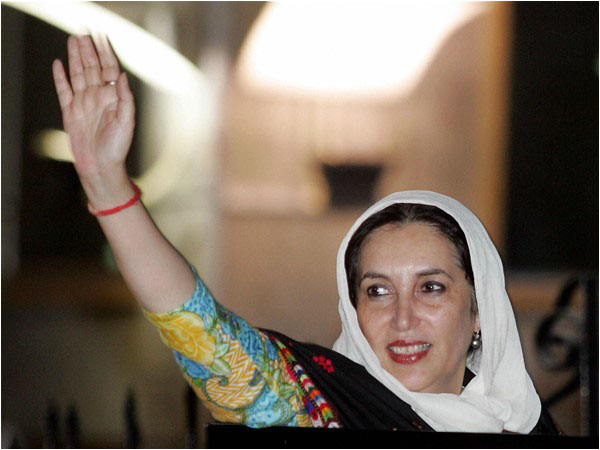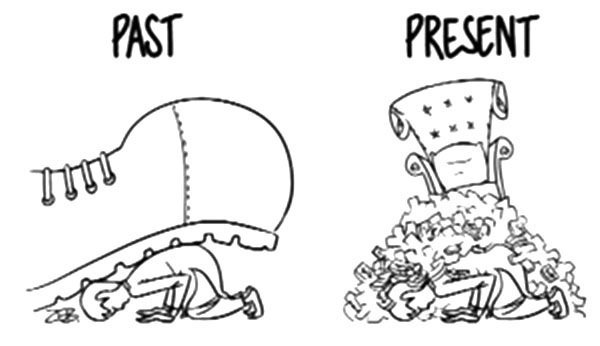
Serving Pakistan
Sir,
The Movement for the Restoration of Democracy (MRD) launched a massive protest campaign in the early summer of 1983. That year, General Zia-ul-Haq’s military regime decided to celebrate Independence Day on 14 August in the grandest way possible, the aim being to divert public attention from the MRD’s agitation. The dictator may be dead, but official celebrations of 14 August continue in a similar vein, with private TV channels making money through publicity campaigns on this occasion.
In Pakistan, patriotism is officially promoted through nationalistic songs, poems, slogans, tall words and flag waving. What the state fails to see is that independence celebrations should be spontaneous and natural, emanating from the people – not just planned and executed by the state and the media. People appreciate their political independence best when they feel safe inside and outside their homes, when they have faith that the state will treat all citizens equally and with respect. When a state protects the rights and freedoms of its people, when it provides equal opportunities and creates conditions for uniform economic and social development, when it ensures justice and fairness for everyone… that is where citizens will happily fulfill their obligations and appreciate their independence as a sovereign country.
The state of Pakistan faces serious challenges, some of which include the following. First, the undemocratic and colonial nature of the state and governance system means that certain people and institutions remain above the law and have no respect for the Constitution or the rule of law. Second, the vast majority of Pakistanis lack a true sense of belonging to their country, given that the political elite treats ordinary people as “subjects”. Corruption has reached the lower levels of society, with many people looting state resources and damaging state property because they feel entirely alienated from the state itself.
Third, attempts to mix national identity and purpose, the state and religion, and the political use of Islam have merely encouraged hypocrisy and a tendency to hide key issues under the carpet. Consequently, both political leaders and the public are willing to shift responsibility and often seek religious justification for inappropriate, illegal or immoral acts. Fourth, the use of militancy as a policy tool has severely damaged the national interest in the long term. Fifth, there are still fundamental differences among stakeholders as to the direction the country should take and which form of political system best suits Pakistan. Finally, we have continued to deny Pakistan’s ethnic and cultural diversity, instead imposing centralist policies and institutions.
Unless we address the above, Pakistan will keep spiraling towards a highly uncertain future.
Shiraz Paracha,
Islamabad.
Language woes
Sir,
Our national language is Urdu and despite the fact that it is spoken widely across the country, it often feels that English has replaced Urdu in terms of the importance it is accorded. More than 50 percent of Pakistanis cannot speak English – does this make them all inferior, uneducated or illiterate? When so many children have not had the good fortune to be born to an educated household or to attend a private English-medium school, they are left lacking confidence and are bullied or looked down on for their poor or nonexistent English. This follows them through to adulthood and becomes part of their personality.
Meanwhile, society continues to consider English more important than Urdu, given its status as a global language and the fact that most school subjects are taught in English (including mathematics, biology, chemistry, and physics) in the rest of the world. It is fine to learn a language that serves as a source of knowledge and is widely spoken around the globe, but in doing so, we should not forget our national culture and legacy. Urdu is an integral part of our identity and not something we should think of abandoning so easily.
Shahid Ahmed Qureshi,
Badin.

Burnt into memory
Sir,
December 16th can easily be termed as the darkest day in the history of Pakistan. As a nation, we take a lot of pride as being an ideological state. One hears rhetoric of far right, laden with faith, challenging basic human nature or quest for identity. Pakistan is a diverse country, from Gilgit Baltistan to the shores of the Arabian Sea, it has diversity all round. People of Pakistan are of different colours, faiths and cultures, if there is any common denominator, it is religion. The idea behind the creation of Pakistan was “Muslim Nationalism” according to which Muslims and Hindus were separate nations within the Indian subcontinent. The idea did not negate the individual cultural identity of Muslims of the region, Bengali Muslims were Bengali Muslims, not Muslim Bengalis, similarly Punjabi Muslims were Punjabi Muslims not Muslim Punjabis so on and so forth. Unfortunately the idea of Muslim Nationalism got replaced with Pan Islamism after independence. Punjabi–Urdu speaking ruling elite turned Pakistan into theo-democracy instead of a democratic Muslim state. The consequences were harsh and the height was East Pakistan giving way to Bangladesh. The 1970 elections divided two wings into Bengali nationalists and Muslim socialists, both secular ideals. The 1970 elections created a very odd situation for the rightist Pakistani establishment; there was a fear that if both political sides take pragmatic approaches and agree to some political arrangement for the future of Pakistan, it would most likely lead to a secular constitution. It was like a nightmare for the establishment, which then initiated a military operation first and later held sham by-elections to weak Bengali nationalists by awarding seats to right wing parties. Sheikh Mujeeb was picked up from his residence in Dhaka on the night of 25th March and shifted to West Pakistan where he remained till the fall of Dhaka. No efforts were made during those months for reconciliation. It seems like nothing has been learnt from the tragedy. Present day Pakistan is somewhat facing the same identity-related issues. Is it the time to go to basics and embrace “Muslim Nationalism”?
Malik Atif Mahmood Majoka,
Australia.

Dark day
Sir,
This day, one of the most unfortunate and deplorable day in the history of Pakistan, when we lost the twice elected prime minister and the voice of poor and downtrodden people of Pakistan. Benazir Bhutto’s murder was a great setback not only for Pakistan but the entire world.
The voice of reconciliation was silenced forever on the fateful evening of December 27, 2007.
The death of Benazir left such a vacuum, one that will never be filled, and the best tribute to pay her is follow and practice her belief in democracy and reconciliation, her firm belief was “democracy is the best revenge” and “democracy removes oxygen from the air of extremists”. She wanted to eliminate extremism from the roots and while trying to accomplish her desire of a democratic Pakistan, free of extremists, she herself became a victim of extremism.
She was very young when she made her choice in life and to quote from one of her lectures, “In life, an individual makes choices. I made mine on the last day of my father’s life in a prison that our colonial masters built in the city of Rawalpindi. That was the choice to fight for peace and democracy, to fight for human dignity that must come when people when people can combat hunger, poverty and illiteracy.”
She was a firm believer of her father’s philosophy of life that, “Life is too precious a gift to squander in bitterness or recriminations. I look to the future, letting go the past. It’s the future that is in our hands, yours and mine. In my life of triumphs and tragedies I learnt that you don’t have to be strong or powerful to succeed. You just have to have the right ideas.”
The whole world mourned the death of Benazir Bhutto; the global media praised her for her sacrifices for the cause of democracy and for the poor of the country; for standing firmly against dictatorial rules. The negative impact on global financial markets indicated the implications of her death and her international stature as a global leader.
During her lifetime, she was accused of using the Sindh card, whereas she never talked of Sindh, is it not unfortunate that even her putting up a white dupatta was injected in the minds of Pakistanis as a symbol of “revenge”. Benazir Bhutto obeyed her great father and got buried where Zulfikar Bhutto wanted her daughter. May her soul rest in peace and let’s pray that we and our generations to come never see days like 16th of October, 1951, 4th of April 1979 and 27th of December 2007.
Aamir Aqil,
Lahore.

Drugs
Sir,
Apropos to the tragic news from the Lahore University of Management Sciences (LUMS) where a student of accounting and finance in his fifth semester found dead in his hostel room due to overdose of heroin. Unfortunately, drugs are becoming very common in hostels and their proliferation and addiction has become a big challenge in universities, especially in private universities.
Alcohol, the stimulants nicotine and caffeine are the most widely consumed psychoactive drugs worldwide. These recreational drugs are used for pleasure rather than medicinal purposes. Psychoactive are chemical substances that affect the function of the central nervous system. These drugs are much costly and only affordable to the rich people. The students belonging to elite and upper class are joining private institutes while poorer students go to madrassas. Colleges and universities are prestigious institutions of society where they study the future of the nation. The prime responsibility goes to administration of universities to check and control the proliferation of drugs in hostels to save nation builders.
There are numerous governmental offices in many countries that deal with the control and oversee of drug manufacture and use, and the implementation of various drug laws. The Drug Regulatory Authority of Pakistan (DRAP) should take serious notice and provide effective coordination and enforcement of the Drugs Act, 1976 in its true spirit in the country.
Mansoor Ahmed,
Faisalabad.

Independent, not!
Sir,
As Pakistanis, we celebrate “Independence Day” every year on the 14th of August. Growing up, my teachers, father, neighbours, friends, and even my President, told me it was called “Independence Day”. In short, everyone around me said that the English “gave” us independence by granting us this country we now call Pakistan. While we celebrate this national day every year, we do not realize what “Independence Day” actually means – we are a nation of followers and called it what our masters told us to call it.
A slight digression: a tenant refused to move out of my house. He would not pay rent and was damaging the property. I took him to court and had him evicted during the week of 14 August. It occurred to me that I should probably thank him for giving me independence by vacating my own house.
The English arrived here as traders, as guests. They were welcomed, but only manipulated our people, illegally took possession of lands, damaged property, stole riches, and substituted local languages with English. They murdered thousands, imposed taxes, and carried out unparalleled atrocities. They were vicious. By contrast, the Muslims ruled over the Subcontinent for a thousand years, did many good things and never tried to influence the local culture (although they are sometimes accused of being complacent in converting Hindus to Islam).
The English were eventually forced out. As they left, they told us they would grant us independence and Pakistanis not only took it prima facie, but thanked them too. We evicted them, but we call it “Independence Day” instead of “Eviction Day”. What a disgrace! The word “independence” suggests we were slaves, which we were not. The English did not “give” us anything; we got what was rightfully ours. They did us no favour and we never needed to be grateful to them.
It is common knowledge that the English are the best manipulators on earth. England has been held responsible for creating turmoil in places like Kashmir, South Africa, the Falklands, and Palestine. Thomas Jefferson, a founding father of the US, called them “the disturbers of our harmony” in the original draft of the US Declaration of Independence.
The English said they were giving Pakistan independence and we accepted that. These were the benevolent English, the “givers” of independence, to us, the freed slaves. Ironically, we removed the English from our land, but not from our minds and lives. By calling it “Independence Day”, we compromise our honour, traditions, language, rituals, and way of life.
Independence Day is an appropriate term for nations that did not exist before their independence, such as the US, where European colonists settled in North America. America never belonged to them. However, there never was a united country in that part of the world, and so they did, in fact, get independence. If Native Americans were to take the US back, it would not be appropriate to call it independence. The Spanish never labelled it independence after they removed the Muslims in Europe and the French never labelled it independence when they were liberated from Hitler.
So why are we so ignorant and self-degrading? Is it because we are followers and have lost our self-esteem? Do we possess a subservient mindset? A follower’s servile mind can never think freely and one will not see pride anywhere near him. A person can be freed from physical incarceration in a moment, but mental captivity takes substantially longer.
I strongly believe that this day should be renamed so that we can retrieve our pride. In my opinion, ROZ-E-INKHILA or ROZ-E-NIJAAT might be appropriate terms. The translation is perfect – ‘Eviction Day’. This name suggests that we evicted the English and got our country back. Our Eviction Day celebrations should demonstrate our national identity, the valour of our heroes, our struggle in evicting the English, and the history of English atrocities.
Rashed Siddiqui,
Florida, USA.

